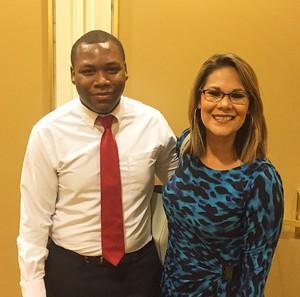If you fill out the "Forgot Password" form but don't get an email to reset your password within 5-10 minutes, please email logistics@ire.org for assistance.

At the 2016 IRE Conference in New Orleans, Knight Scholar Will Fuller sat down with Vanessa Araiza, a weekend anchor and reporter at WBRC in Birmingham, Alabama.
Fuller: Why journalism?
Araiza: I was never a news junkie. I wanted to be an attorney [when I was younger] because they made a lot of money, and they got to argue for a living. During my senior year in high school, I started on the drill team. We were going to New York for a St. Patrick’s Day parade and a news crew came out and said they needed someone to interview. I said I would do it. I was interviewed by a local news reporter and said, that’s what I want to do – I want to do that.
Fuller: How did you start off in the journalism industry?
Araiza: I went to college in Pensacola, a mid-size market. When I was in college, I told myself I was going to get a job at my local TV station. I didn’t know how it was going to happen, but I said I was going to do it. I got a job at my local TV station as a production assistant. I think I got paid $6/hour part time. I would run camera scripts – whatever they needed me to do. But on my free time, I would follow a reporter. One semester, I was taking a full load of courses, serving tables to pay bills, working at the TV station to gain experience and also interning at the same TV station to learn.
Fuller: Was it hard to juggle all of those responsibilities?
Araiza: It was difficult; I was exhausted and so tired. But I thought, “it’s not going to last long.” You have to do this if you want to make it in the business. I got a great tape. I made tons of connections, and they helped me get a job.
Fuller: Was it difficult for you to get a job?
Araiza: For me it was. People have different stories. A friend of mine got a job immediately. I sent out 60 resume tapes and I remember getting rejection letters in the mail. I remember sitting on my living room floor crying because I thought, I am not going to get a job. But I did eventually, and it was through word of mouth – that’s how I’ve gotten every job. It’s because I knew somebody who knew somebody – the industry is so small.
Fuller: What challenges have you faced in the industry?
Araiza: Money – you start off not making a lot of money and you’re overworked. You have to tweet; you have to Periscope and Facebook, maybe Snapchat. If you’re just starting out, you may be thinking, I’m new to this and what am I doing?’ On top of that you’re making $10/hour before taxes. How am I going to pay my rent? I asked myself, how am I going to have a social life when I can’t afford it and I’m tired? But it’s worth it.
Fuller: Why is journalism still worth it despite the difficulties you’ve faced?
Araiza: You get to help people, which is amazing. I once did a story about a community with constant flooding problems. So, I went out there and did a story, and as a result, the city fixed the flooding problem. The community president came to me and said, “Thank you so much, you got this done for us.” So, you have this platform that not a lot of people have to help these people, and it’s amazing.

Looks like you haven't made a choice yet.